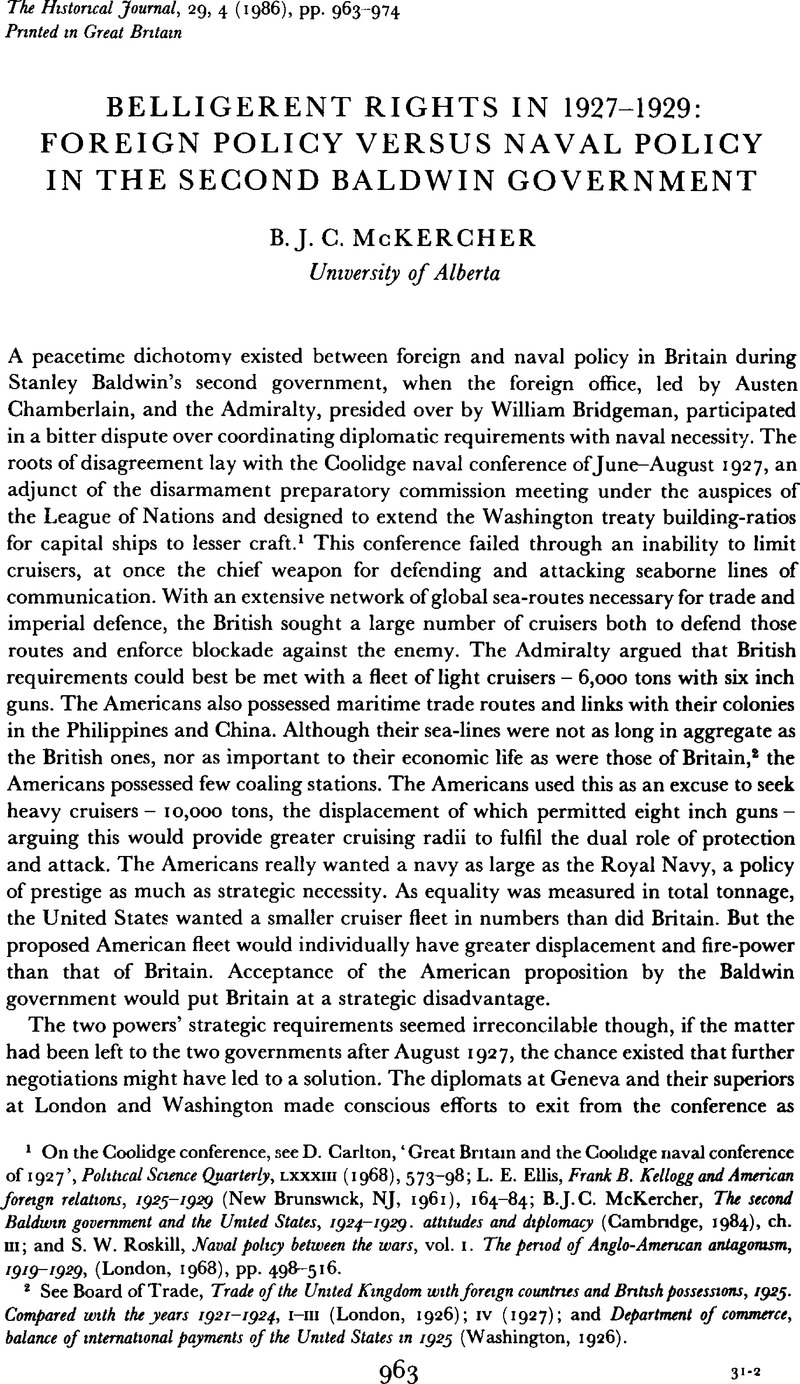Published online by Cambridge University Press: 11 February 2009

2 See Board of Trade, Trade of the United Kingdom with foreign countries and British possessions, 1925. Compared with the years 1921–1924, I–III (London, 1926); IV (1927)Google Scholar; and Department of commerce, balance of international payments of the United States in 1925 (Washington, 1926)Google Scholar.
3 ‘Verbatim Report of the Third Plenary Session’, 4 Aug. 1927, F[oreign] O[ffice Archives, Public Record Office, London] 371/12674/7499/61.
4 For example, speech by MacDonald, J. R. [leader of the opposition], 24 11 1927, House of commons debates, 5th Series, ccx, Cols. 2089–2101Google Scholar; and naval construction proposal by Butler, Thomas [House naval affairs committee], 14 12 1927, Congressional record, 70th Congress, 1st Session, 1927, LXIX, Part 1, 479Google Scholar.
5 McKercher, Second Baldwin government, ch. IV.
6 Coolidge had decided suddenly to resign. On this and the British reaction, see Rhodes, B. D., ‘British diplomacy and the silent oracle of Vermont, 1923–1929’, Vermont History, L (1982), 69–79Google Scholar.
7 Howard to Chamberlain, 29 Jul. and 1 Sep. 1927, both FO 800/261.
8 Chamberlain memorandum on ‘Belligerent rights at sea and the relations between the United States and Great Britain’, 26 Oct. 1927, enclosing Chamberlain memorandum for Tyrrell [FO permanent under-secretary], 16 Oct. 1927; Vansittart [FO American dept.] memorandum, 19 Oct. 1927, enclosing Craigie [FO American dept.] memorandum, 17 Oct. 1927, all CAB[inet Archives, Public Record Office, London] 24/189.
9 Chamberlain, to Cecil, [British minister responsible for disarmament], 5 07 1927Google Scholar, FO 800/261.
10 Chamberlain memorandum [CP 286(27)], 14 Nov. 1927, CAB 24/189.
11 Pound, to Keyes, [commander-in-chief of the Mediterranean Fleet], 10 08 1927, KEYES [Churchill College, Cambridge] 15/20Google Scholar.
12 Roskill, Naval policy, 1, 555.
13 Chamberlain, ‘Memorandum’, 16 10 1927Google Scholar, in Hermon-Hodge, [secretary, Belligerent Rights Sub-Committee] ‘Note’, 19 01 1928, CAB 16/79Google Scholar.
14 See McKercher, B. J. C., ‘Austen Chamberlain's control of British foreign policy, 1924–1929’, International History Review, VI (1984), 570–91CrossRefGoogle Scholar.
15 For an indication, see Hankey, M. P. A., The supreme command 1914–1918, II (London, 1961), pp. 857–63Google Scholar.
16 On the negotiation of Locarno, see Jacobson, J., Locarno diplomacy. Germany and the west 1925–1929 (Princeton, 1972), pp. 3–76Google Scholar. On Hankey's views, see Hankey diary, 22 Mar. 1925, HNKY [Churchill College, Cambridge] 1/17.
17 Cabinet conclusion 57(27)7; CAB 23/55.
18 On Salisbury and the Fleet Air Arm controversy, see Roskill, Naval policy, 1, 372–8. Also see Cmd. 1938 and Cmd. 2029.
19 Roskill, S. W., Hankey man of secrets, II: 1919–1931 (London, 1972), pp. 451–5Google Scholar.
20 For instance, Hunt, B. D., ‘British Policy on the issue of belligerent and neutral rights, 1919–1939’, in Symonds, C. L. et al. (eds.), New aspects of naval history (Annapolis, 1981), pp. 279–90Google Scholar.
21 Roskill, Hankey, II, 451–5.
22 Hermon-Hodge note, 19 Oct. 1928, CAB 16/79.
23 See Chamberlain minute [CP 22(28)], 24 Jan. 1928, CAB 24/192; and Vansittart minute, 18 Jan. 1928, FO 371/12789/318/1. Also see Cabinet conclusion 47(28)5, CAB 23/59.
24 Belligerent rights first meeting, 11 Jan. 1928, CAB 16/79.
25 See Wellesley [FO deputy under-secretary] minute, 21 Mar. 1928, FO 371/12823/2097/133.
26 Belligerent rights first meeting, II Jan. 1928, CAB 16/79.
27 Hankey diary, 11 Jan. 1928, HNKY 1/8.
28 Belligerent rights second meeting, 6 Feb. 1928, CAB 16/79; Hankey to Salisbury, 9 Mar. 1928, CAB 21/307; and Craigie minute, 6 Feb. 1928, enclosing Craigie memorandum, 6 Feb. 1928, FO 371/12822/968/133.
29 Salisbury memorandum, 27 Mar. 1928, CAB 16/79.
30 Belligerent rights third meeting, 30 Mar. 1928, CAB 16/79.
31 Campbell [British embassy, Washington] despatch to foreign office, enclosed in Chamberlain note, 24 Mar. 1928, ibid.
32 Howard telegram (121) to Chamberlain, 19 Apr. 1928, FO 371/12823/2679/133; Howard telegram (122) to Chamberlain, 19 Apr. 1928, FO 371/12823/2674/133; and Craigie memorandum on ‘Conversations at Washington respecting belligerent rights at sea’, 8 Jun. 1928, CAB 16/79.
33 McKercher, B. J. C., ‘A British view of American foreign policy: the settlement of blockade claims, 1924–1927’, International History Review, III (1981), 381Google Scholar.
34 Belligerent rights fourth meeting, 27 Jul. 1928, CAB 16/79.
35 Craigie memorandum on ‘Conversations at Washington during April 1928… ’, 1 Jun. 1928, Ibid.
36 Hankey to Lloyd George, 18 Nov. 1921, in Roskill, , Hankey, II, 244–5Google Scholar.
37 See Wheeler-Bennett, J. W., Disarmament and security since Locarno, 1925–1931 (London, 1932)Google Scholar. For the compromise, see Cmd. 3211.
38 This can be traced in ibid.
39 Office of the president, Address of President Coolidge…11 November 1928 (Washington, 1928)Google Scholar.
40 Howard telegram (329) to FO, 15 Nov. 1928, FO 371/12823/7862/133.
41 Craigie outlined the differing views succinctly in a brilliant minute, 26 Nov. 1928, FO 371/12812/8078/39.
42 Belligerent rights fifth and sixth meetings, 1 and 8 Nov. 1928, CAB 16/79.
43 Craigie minute, 26 Nov. 1928, FO 371/12812/8078/39; and Cushendun to Chamberlain, 22 Nov. 1928, and Salisbury to Chamberlain, 22 Nov. 1928, both FO 800/263.
44 Cabinet conclusion 55(28) I: CAB 23/59.
45 Hankey to Salisbury, 10 Dec. 1928, CAB 21/320.
46 Hankey diary, 7 Dec. 1928, HNKY 1/8.
47 Salisbury to Hankey, 11 Dec. 1928, CAB. 21/320. On Baldwin's conversion, see Jones [Baldwin's private secretary] diary, 6 Dec. 1928, in Middlemas, K., ed., Thomas Jones: Whitehall diary, II (London, 1969), p. 161Google Scholar.
48 Salisbury memorandum, 17 Dec. 1928, CAB 16/79.
49 ‘First report of the sub-committee of the committee of imperial defence on belligerent rights’, 13 Feb. 1929, ibid.
50 Belligerent rights tenth meeting, 1 Feb. 1929, ibid.
51 See Hankey to Salisbury, 4 Feb. 1929, CAB 21/310.
52 Belligerent rights eleventh meeting, 4 Feb. 1929, CAB 16/79.
53 Belligerent rights twelfth to sixteenth meetings, ibid.
54 ‘Second report of the sub-committee of the committee of imperial defence on belligerent rights’, 6 Mar. 1929, Ibid.
55 See Roskill, , Hankey, II, 491–6Google Scholar.